Politics
/
August 2, 2024
Mayor Karen Bass’s administration has failed to realize its ambitions for public housing.
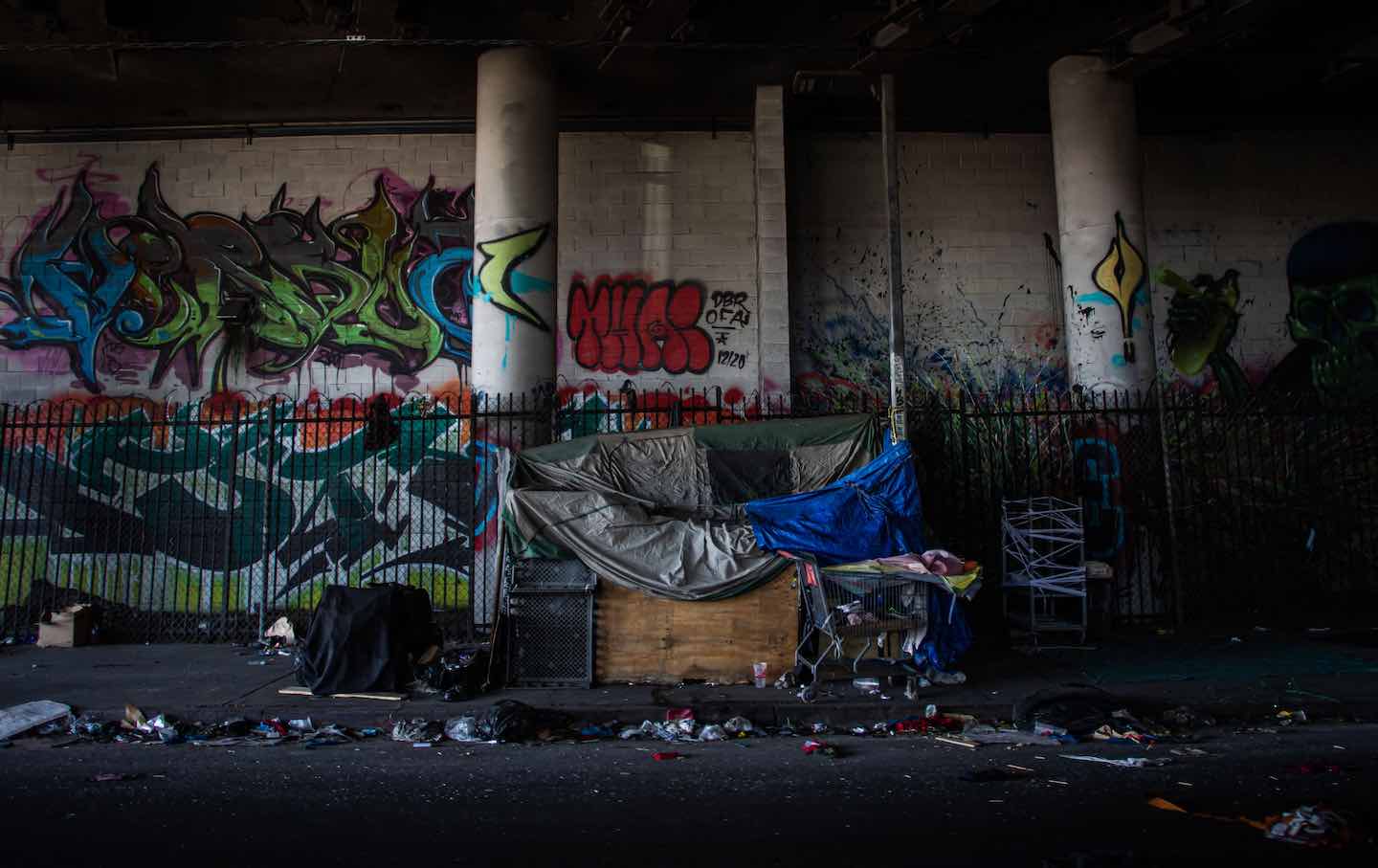
A homeless encampment under a bridge in downtown Los Angeles on July 26.
(Photo by Apu Gomes / AFP)
When Karen Bass was elected mayor of Los Angeles, it seemed like the city’s shameful neglect of its housing crisis would finally end. Bass, after all, is a progressive, and she staked much of her political capital during her mayoral campaign on a commitment to addressing the sprawling city’s interconnected crises of homelessness and the lack of affordable and supportive housing.
Two years later, that promise has not been kept, and progress made through Bass-backed programs like Inside Safe, which moved thousands of people off the streets and into motels, is now at risk of being undone, according to advocates who have argued in court that city officials are using their influence to block new housing developments in affluent areas of the city. Becky Dennison, co-executive director of the Venice Community Housing Corporation, told me in a recent conversation that different agencies and city officials are at war with each other over how to address the housing crisis and whether to share the burden equitably among neighborhoods. “There’s no unified message coming out of the city; it’s total uncertainty. It creates a lose-lose situation.”
True, street homelessness numbers have declined for the first time since the start of the Covid pandemic, at least in part thanks to Bass’s efforts on the issue. But the declines are small (just over 2 percent in 2024), and more than 45,000 people continue to live on Los Angeles’s sidewalks, with tens of thousands more in the surrounding county.
When Los Angeles residents are polled, they overwhelmingly say that housing and homelessness are their top local concerns, and a large majority of residents favor greater city and state involvement in the development of affordable housing in the region. Two-thirds of residents also want more rental units in their neighborhoods. But progress is being stifled by an unsavory coalition of developers and wealthy homeowners, who have sought to block affordable housing from being built in the city’s wealthiest areas.
Karen Bass’s much-vaunted Executive Order 1, which aimed to accelerate the city’s public housing projects, has been watered down to the point of absurdity. Under pressure from homeowners, particularly on the affluent West Side and in the San Fernando Valley’s most luxurious enclaves, Bass rewrote the order to exclude neighborhoods zoned exclusively for single-family homes. This change automatically excluded about three-quarters of the city, including most of its wealthy and politically influential neighborhoods, from meeting public housing and supportive housing goals. The areas that were not excluded were poorer and less white, so poverty and homeless services remained concentrated in already struggling communities.
Perhaps nowhere has the promise been less effective than in Venice, a picturesque beach community that has seen an explosion of homelessness and encampments in recent years. As I wrote in 2021, homes along Venice’s canals can cost millions of dollars; meanwhile, a year into the pandemic, thousands were sleeping in tents along the boardwalk, in alleys, and in parking lots.
Current problem
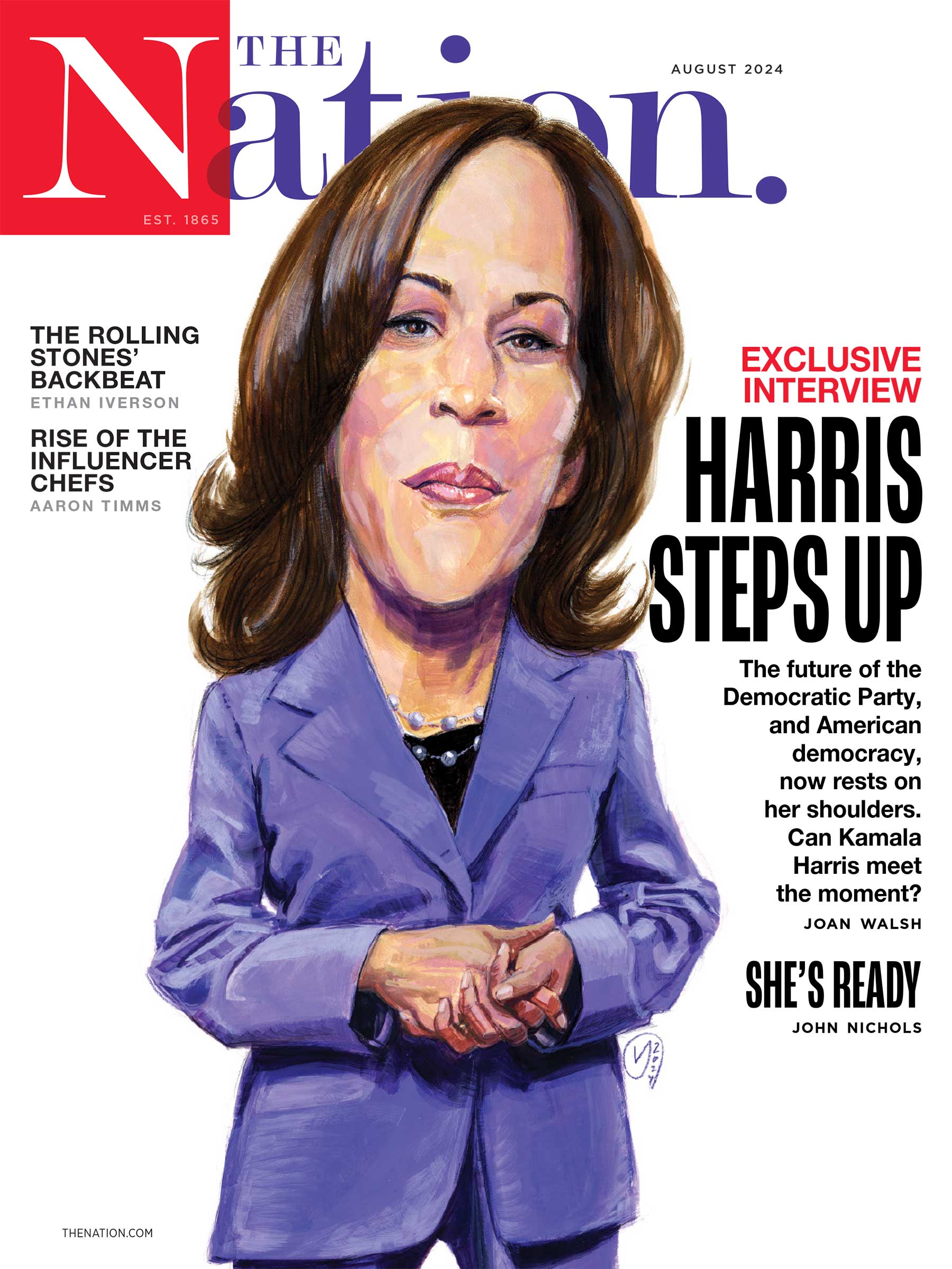
In the years since, many of the encampments have been razed, and more will likely be dismantled following the recent Supreme Court ruling allowing cities to close encampments and Gov. Gavin Newsom’s executive order urging cities to do just that. But Venice’s affordable housing crisis remains as acute as ever.
Dennison’s group hopes to break ground on a 140-unit supportive housing development, one of eight city-owned parcels identified in 2016 as suitable for such projects, in early 2026. It’s known as the Venice Dell supportive housing development, and it was conceived as part of a larger, coordinated effort to address the community’s housing crisis. So far, though, it’s more of a dream than a reality.
In a sign of just how dysfunctional Los Angeles’ housing policy is, city agencies, urged on by affordable housing advocates, recently fought off two lawsuits filed by NIMBYist community groups opposed to the project. The city won the lawsuits, quelled the NIMBYists, and for a while it looked like the project would move forward as planned. In the meantime, however, City Councilwoman Traci Park and the City Attorney’s office under Hydee Feldstein Soto have quietly launched their own rearguard action to thwart the project, pressuring the City Planning and Transportation departments to withhold vital clarification notices from the Coastal Commission, without which the commission cannot issue the final permits needed to begin development projects near the ocean. Those documents have been frozen for more than a year, resulting in a fair housing lawsuit filed against the city last month and an investigation launched by the state’s housing accountability unit.
In other words, taxpayer money was recently spent to allow the city to fight in court for affordable housing development. Now, more taxpayer money will be spent to allow the city to defend itself in court against allegations of illegal opposition to that same development. This is not just dysfunctional; it is absurd.
Since January 2023, Dennison’s organization has been asking the Coastal Commission if the necessary paperwork has been submitted and if the project can proceed. And every time they ask, the commission tells the group they need to get more information from the city attorney or Councilman Park, information that never comes. “Everyone is just pointing fingers at each other,” Dennison says, exasperated.
For Mike Bonin, who represented Venice on the city council from 2013 to 2022 and now teaches public policy at Occidental College and USC, and who has long worked on housing issues in his community, the ongoing efforts are nothing short of shameful. “A lot of this has been done behind the scenes, without a council vote,” he says. “There’s been an approach, both through politics and through denial of projects, to shift the problem to other parts of the city.” The wealthier, whiter areas of the city, Bonin argues, are “very resistant to more housing—they don’t like affordable housing, they don’t like homeless housing.” As a result, projects like the Venice Dell are stalling, encampments are being bulldozed, and existing homeless shelters on the West Side are being closed while homeless people in those facilities or on the streets are being relocated to poorer, less white neighborhoods around Los Angeles. “Every neighborhood in Los Angeles needs to be part of the solution,” Bonin says. “But there are parts of the city that are exempting themselves. Everyone needs housing. This is, to me, a moral absolute.”
Mayor Bass’s instincts to address the housing crisis are sound. But his administration has failed to live up to his public housing ambitions over the past two years. The challenges facing the Dell project in Venice epitomize the chaos and dysfunction surrounding housing policy in the greater Los Angeles region. It’s time for the mayor to take charge and greenlight major public housing projects.
Can we count on you?
In the upcoming election, the fate of our democracy and basic civil rights are at stake. The conservative architects of Project 2025 are planning to institutionalize Donald Trump’s authoritarian vision at every level of government if he wins.
We have already witnessed events that fill us with both terror and cautious optimism, in all of this, The nation has been a bulwark against misinformation and a champion of bold, principled perspectives. Our dedicated writers sat down with Kamala Harris and Bernie Sanders for interviews, parsed J.D. Vance’s shallow right-wing populist appeals, and discussed the path to a Democratic victory in November.
Stories like these and the one you just read are vital at this critical moment in our country’s history. Now more than ever, we need independent, lucid, and deeply researched journalism to make sense of headlines and separate fact from fiction. Donate today and join our 160-year legacy of speaking truth to power and elevating the voices of grassroots advocates.
Throughout 2024, and in what will likely be the defining election of our lifetimes, we need your support to continue publishing the eye-opening journalism you rely on.
Thank you,
The editors of The nation
Sasha Abramsky
Sasha Abramsky, who writes regularly for The nationHe is the author of several books, including Inside Obama’s Brain, The American Way to Fight Poverty, The House of 20,000 Books, Jumping to the shadowsand, more recently, Little Wonder: The Fabulous Story of Lottie Dod, the World’s First Female Sports SuperstarSubscribe to The Abramsky Report, a subscription-based weekly political column, here.
More from The nation
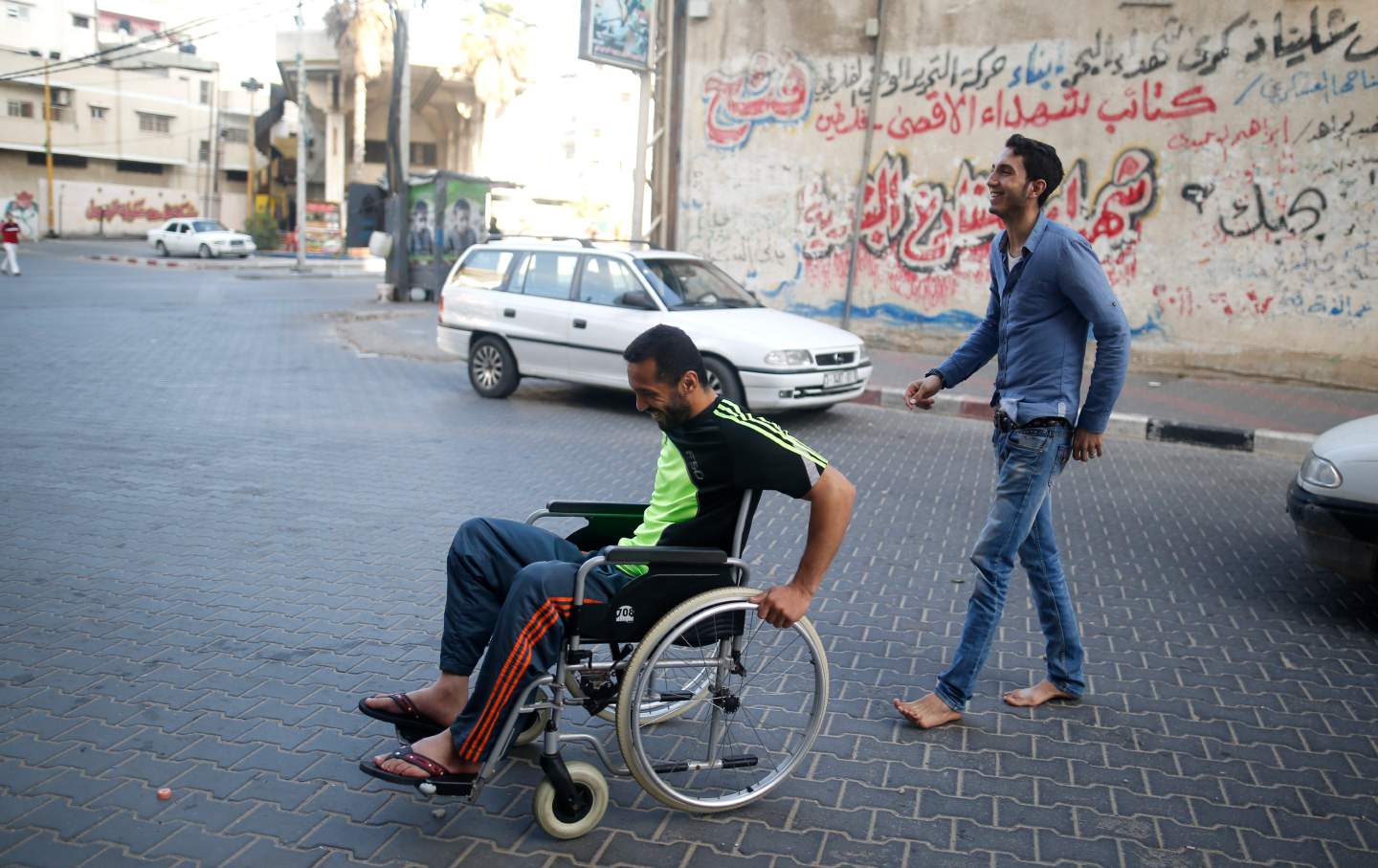
The shot putter is the only competitor in the Palestinian Olympic delegation from Gaza.
Dave Zirin AND Julius Boykoff

I, Ilhan Omar, see a bright future under Kamala Harris. Here’s what it might look like if she wins.
Representative Ilhan Omar
![]()
The ubiquitous high-tech surveillance introduced for the Games normalizes incursions into civil liberties.
Julius Boykoff AND Dave Zirin
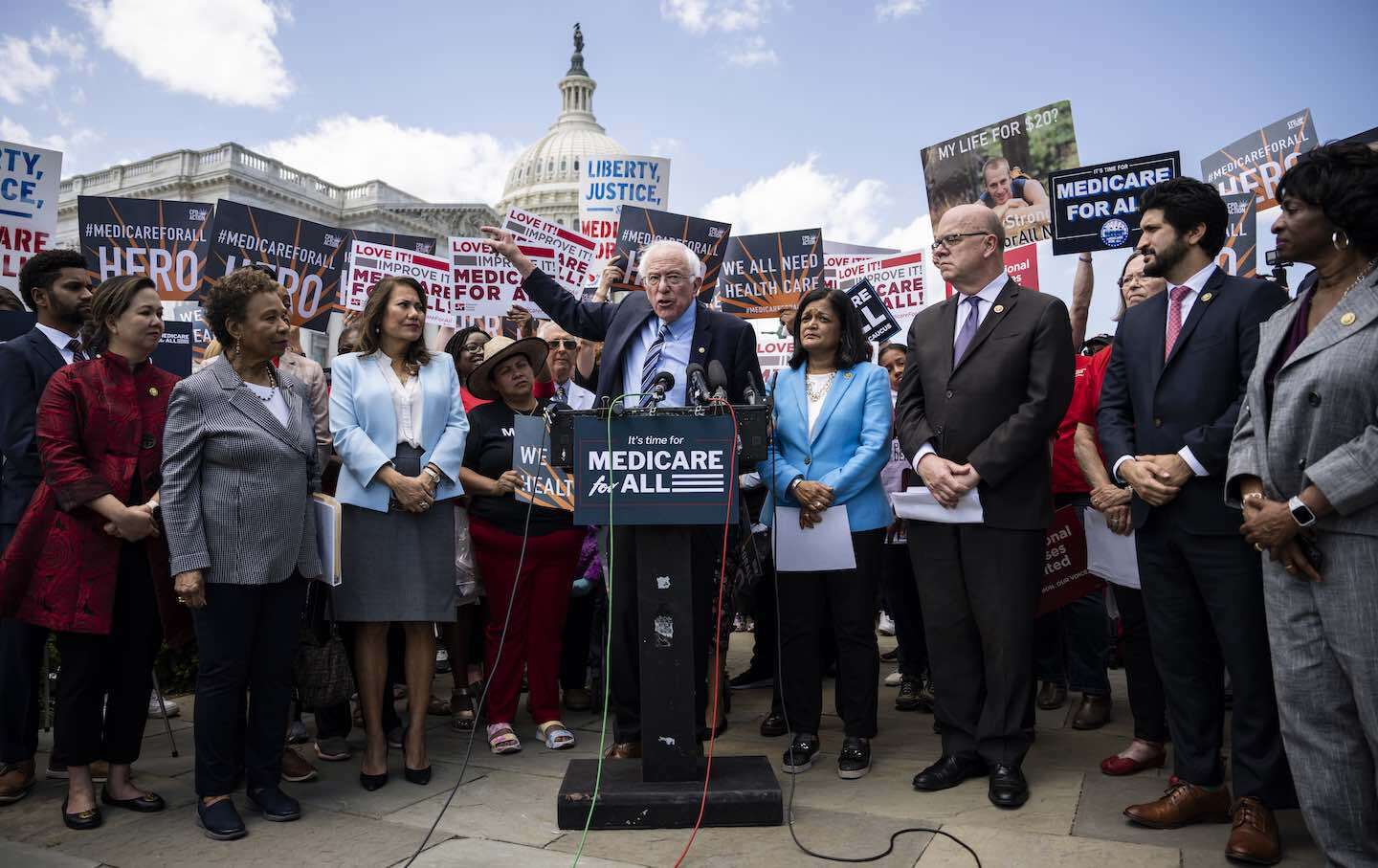
While Trump’s platform poses a serious threat, Harris’s remains uncertain.
Adam Gaffney
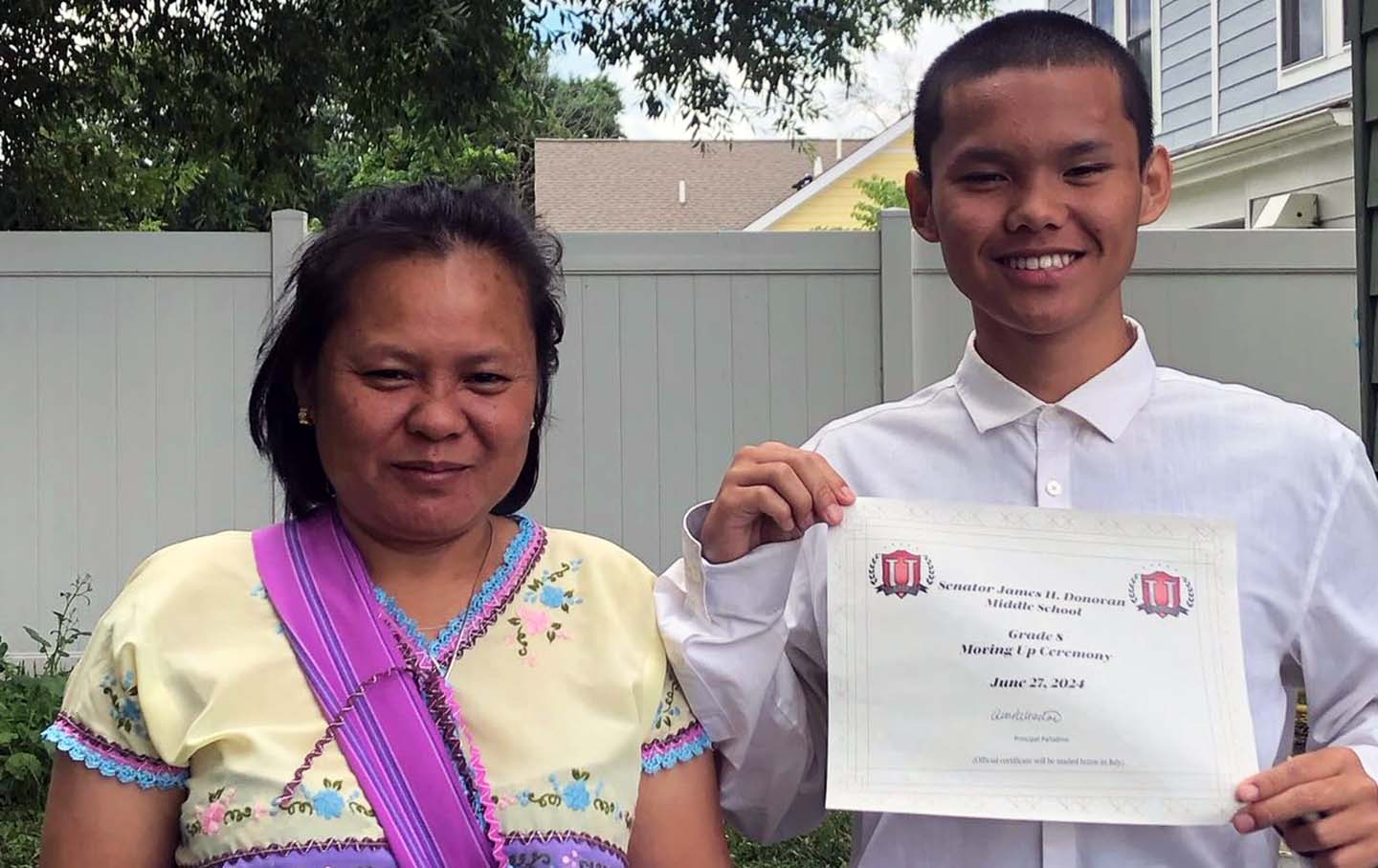
Nyah Mway graduated from middle school. The next day an officer shot and killed him.
Kelly X. Hui





